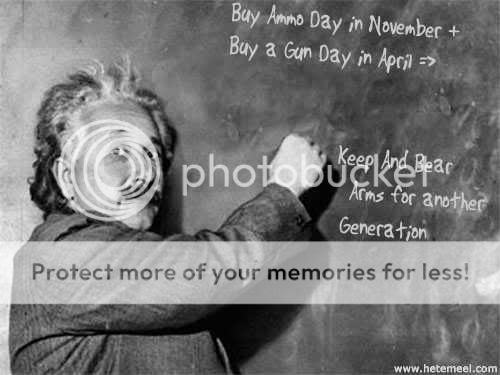FrugalFannie
NES Member
No need to be embarrassed. After I did my audit last night, I set up an Excel spread sheet too.
Like you, I seem to accumulate more ammo these days than I expend.![Grin [grin] [grin]](/xen/styles/default/xenforo/smilies.vb/041.gif)
I can help you correct that problem.
![Smile [smile] [smile]](/xen/styles/default/xenforo/smilies.vb/001.gif)
If you enjoy the forum please consider supporting it by signing up for a NES Membership The benefits pay for the membership many times over.
Be sure to enter the NES/MFS May Giveaway ***Canik METE SFX***
No need to be embarrassed. After I did my audit last night, I set up an Excel spread sheet too.
Like you, I seem to accumulate more ammo these days than I expend.![Grin [grin] [grin]](/xen/styles/default/xenforo/smilies.vb/041.gif)
![Smile [smile] [smile]](/xen/styles/default/xenforo/smilies.vb/001.gif)
"Although the code permits up to 10,000 primers for private use, no more than 5000 may be stored in a residence, which includes the dwelling unit and all accessory buildings (the shed). So only 5000 primers may be stored at your home, still preferably in the secured shed and not the dwelling unit. If you want to exceed the limits set forth in the regulation then you must apply for a license from the Town. This process is involved, to include advertising in the local newspapers, sending certified letters to all you abutters notifying them of your intent and going before the Board of Selectman. Other permits from federal agencies, such as ATF, may also be required"
Thanks for the info, I'm absolutely dumbfounded. I wonder if people often go through this process. Or what the reporcussions are for those who don't. I imagine LTC rovocation is an understatement here in MA where they are itching for a reason to do that anyway.
Lugnut seems to be correct in the 5,000 primer limit.
If you read down to 527 CMR 13.11 (3) (d) it reads:
"No more than 5,000 small arms primers shall be stored in residences."
However, I don't see anything there that refers to local government allowances to alter the amount.
Gotta love the way Mass laws contradict themselves.
Is there anywhere one can lookup what safe storage practices are? I do not reload - (although I might in the future), and I wondering what the recommended practices are for safe storage - especially primers.
I am assuming that the limits on primers are lower than completed ammo because of their volatility. So I am curious as to what the "best practices" might be for storage.
I store all of my ammo in sealed military ammo cans with a few dessicant bags thrown in each one.
I have read that ammo in fires does not necessarily go off the way Hollywood would have you believe but is more likely to "cook off" .
I am assuming that the limits on primers are lower than completed ammo because of their volatility. So I am curious as to what the "best practices" might be for storage.
Depends on what you mean by volatility. They don't just go off on their own, but they are explosive like traditional gunpowder. Smokeless is not explosive (meaning the expansion properties are slower and more controlled). In other words, gunpowder and primers go boom, smokeless burns.
As an aside, I am quite sure that all three of the examples above are not "explosive" in the traditional sense.
Guncotton, black powder and the main ingredient in primers, mercury fulminate, are considered "low explosives", which means that the chemical reactions produce incredible pressure via gaseous expansion in whatever they are contained in, and go "pop" when the pressures inside exceed the rating of the casing. These are called deflagrations.
A true "high explosive" that detonates is a compound that generates supersonic shock waves just behind the initial wave front of energy when the combustion occurs, and the energy released has nothing to do with contained pressures.
Such as the results from Little Boy and Fat Man from like 63 years ago or so.
Those who have never gone "shooting" with Greg have no idea how hilarious that is.
![Smile [smile] [smile]](/xen/styles/default/xenforo/smilies.vb/001.gif)

![Laugh [laugh] [laugh]](/xen/styles/default/xenforo/smilies.vb/012.gif)
![ROFL [rofl] [rofl]](/xen/styles/default/xenforo/smilies.vb/013.gif)
![Laugh at above [laugh2] [laugh2]](/xen/styles/default/xenforo/smilies.vb/014.gif)
Yeah, I was not suggesting by explosive that they were high explosives like an A-Bomb, C4, etc, but I did not feel the need to be specific. Since you did, the issue with primers and black powder are they can, in quantities common enough (aka, in qtys normal shooters would be expected to have), go pop with enough force and with very little containment that the effect is similar to a true detonation. Smokeless burns slow enough that it would burn and the pressure wave would travel slow enough that the pressure needed to cause damage would never build up in common containers. Black powder on the other hand burns fast enough to build up pressure and could cause damage with very limited containment. It is simply a matter of degree. That's why a pill bottle of smokeless lit on fire is a genie and one of blackpowder is a bomb by any standard.
![Wink [wink] [wink]](/xen/styles/default/xenforo/smilies.vb/002.gif)
